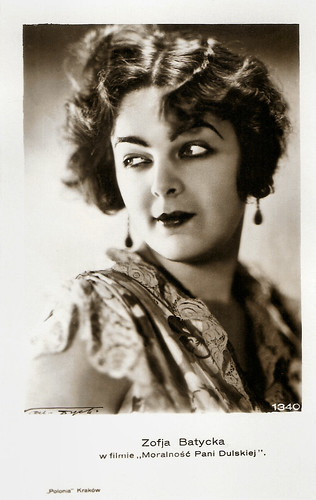
Polish postcard by Polonia, Krakow, no. 1340. Photo: Van Dyck. Zofia Batycka in Moralność pani Dulskiej/The Morality of Mrs Dulska (Borys Newolin, Boleslaw Land, 1930).

Polish postcard by Polonia, Krakow, no. 13381. Photo: Van Dyck. Zofia Batycka in Moralność pani Dulskiej/The Morality of Mrs Dulska (Borys Newolin, Boleslaw Land, 1930).
An affair with tenor Jan Kiepura
Zofia Batycka or Zofja Batycka was born in 1907, in Lemberg, Austria-Hungary, now Lviv, Ukraine. Batycka was the daughter of Eugeniusz Batycki, a famous Galician lawyer, and Janina née Podstawska, owners of the Turkułłów-Comello Palace in Lemberg. She attended the Ursuline Gymnasium and House of the Congregation of Sisters of the Ursuline in Lemberg and then studied at the Women's High School of Economics in Snopków
Between 1928 and 1929, Zofia Batycka had an affair with tenor Jan Kiepura, but their relationship ended because the artist travelled abroad too often and had no time for his beloved. Zofia began her acting career at the instigation of the actor and director Ludwik Solski. Still a student Zofia made her debut in the film.
From 1929 on she played in Polish films, first in the silent Sfinks production Grzeszna milosc/Sinful Love (Zbigniew Gniazdowski, Mieczyslaw Krawicz 1929) starring Jadwiga Smosarska, partly filmed at the Tatra Mountains.
It was followed by Szlakiem hanby/Export in Blond (Mieczyslaw Krawicz, Alfred Niemirski 1929) and Dusze w niewoli/Souls in Bondage (Leon Trystan 1930). Her first sound film was Moralnosc pani Dulskiej/The Morality of Mrs Dulska (Boleslaw Newolin 1930), based on Gabriela Zapolska's eponymous drama. The film was shown with a sound-on-disc system. Today, the records are lacking, so only a silent version exists.
Then she was the leading lady in the sound film Kobieta, która sie smieje/The Woman Who Laughs (Ryszard Ordynski, 1931) which was shot at the French Paramount sound studios in Joinville-de-Pont. It was the Polish version of the Paramount production The Laughing Lady (Victor Schertzinger, 1929) starring Ruth Chatterton. Her final film was the sound feature Dziesieciu z Pawiaka/10 Condemned (1931), directed again by Ryszard Ordynski, and starring Józef Wegrzyn and Karolina Lubienska.

Polish postcard by Polonia, Krakow, no. 1341. Photo: Van Dyck. Zofia Batycka in Moralność pani Dulskiej/The Morality of Mrs Dulska (Borys Newolin, Boleslaw Land, 1930).
In Moralność pani Dulskiej/The Morality of Mrs Dulska, the Dulski family takes in a new maid, Hanka (Dela Lipińska). The girl falls in love with their son Zbyszek (Tadeusz Wesołowski). An affair ensues between the young couple, resulting in an illegitimate child. Zbyszek wants to marry the girl but encounters resistance from his parents. Batycka played the supporting part of an actress.
Miss Paramount 1931
Zofia Batycka won the title of Miss Polonia 1930 and became very popular, so she joined the Miss Europe 1930 contest in Paris. The winner that year was Miss Greece Aliki Diplarakou, Miss Belgium was second, and Miss France third.
In 1931, Batycka made her debut as a theatre actress, appearing in the play 'Romantyczna noc' (Romantic Night) by Hans Bachwitz. She embarked on a tour of Poland with it, during which she played in 35 cities in 35 days. While working in Joinville near Paris on the Paramount production Kobieta, która sie smieje/The Woman Who Laughs (Ryszard Ordynski, 1931), Batycka was crowned Miss Paramount 1931. She decided to move to Hollywood in the hope of a film career there.
In 1932, Batycka signed with the American label International Artists and moved to the US. While away, the Miss Poland 1931 pageant couldn't go through as Batycka had forgotten to hand over the temporary crown. Her Hollywood contract proved to be completely unsuccessful - in fact, she didn't do any movies in Hollywood. In 1933, she became engaged to aviator Aldo Gerardi, son of a wealthy Italian industrialist, whom she had met in 1931. Ultimately, however, the couple's wedding, planned for the summer of 1933, did not materialise.
In 1934 she returned to Poland and for a time she worked as a theatre actress there. In 1934, she appeared on the stages of travelling theatres, and in 1935 she played in the revue 'Konterfekty i ploteczki z dworu króla Stasia' (Conterfects and Gossip from King Stasia's Court) at a theatre in Lemberg. She gave up acting and married Frans Hendrik (François Henri) Pittevil, a director of a commercial society from Belgium. The couple married in 1938 at the Caxton Hall office and later at Westminster Cathedral in London. They settled in Antwerp.
In 1940 the couple emigrated to the United States, where they lived successively in New York and Fort Lauderdale, Florida. In 1946, Zofia Batycka was granted American citizenship and from then on she functioned in documents as Sophie Marie Pittevil. In September 1946 the Pittevil family returned to Antwerp, where Frans Hendrik Pittevil died in 1949 at the age of 67. Zofia Batycka returned with her mother to the US and maintained herself by teaching foreign languages (she mastered four languages), and then worked in the gallery Back Street Antiques. After retiring she went to live in a nursing home in Los Angeles where she died in obscurity in 1989. Sophie Pittevil was buried in Hollywood Forever Cemetery in Los Angeles.

French postcard by A.N., Paris, no. 14.

German postcard by Ross Verlag, no. 35/1. Photo: Van Dyck, Warsaw. Caption: Zofia Batycka, Miss Polonia 1930.
Sources: Marek Teler (Encyklopedia Teatru Polskiego- Polish), K. Stepan, J. Maśnicki (Pleograf. Słownik biograficzny filmu polskiego 1896–1939, Kraków 1996), Filmpolski (Polish), Wikipedia (English, Ukrainian and Polish), and IMDb.
No comments:
Post a Comment